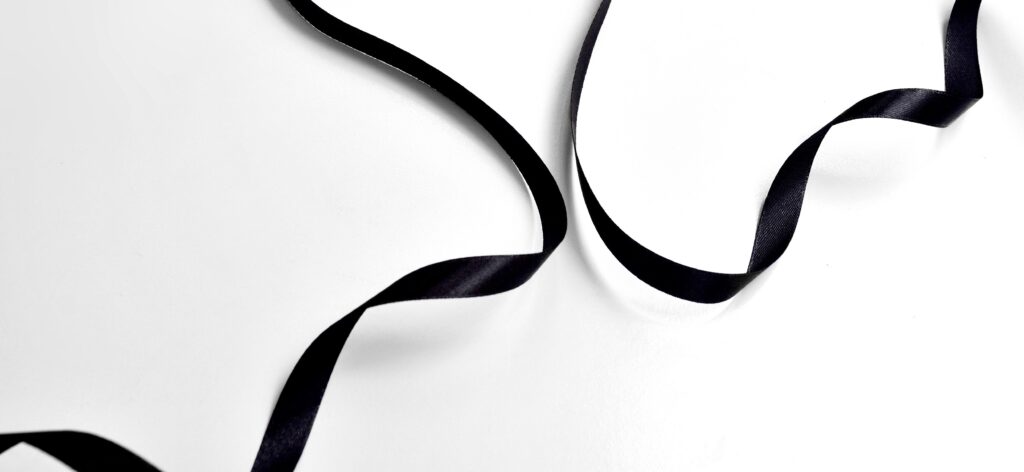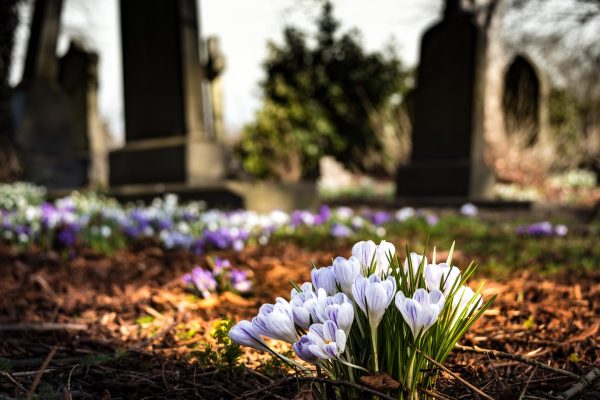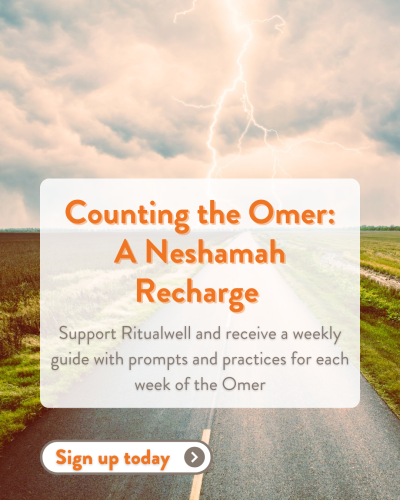This ritual is intended to take place in a hospital room with an intimate group. The intention is to mark the birth and death of a newborn baby—with a naming ceremony and a ritual for saying goodbye, in the tender moments before the hospital staff takes the baby from the parents for the last time.
[Note that pronouns for the baby in this document are “they” for simplicity, but officiant should replace with relevant pronouns for the individual child].
Grounding
We’ll begin with a niggun, a wordless melody. This is the melody for a prayer that calls in angels on every side of us for protection before we go to sleep each night. And so we call them in now.
Sing: Bshem Hashem Niggun
בְּשֵׁם הַשֵּׁם אֱלֹהי יִשְׂרָאֵל, מִימִינִי מִיכָאֵל, וּמִשְּׂמֹאלִי גַּבְרִיאֵל, וּמִלְּפָנַי אוּרִיאֵל, וּמֵאֲחוֹרַי רְפָאֵל, וְעַל רֹאשִׁי וְעַל רֹאשִׁי שְׁכִינַת אֵל
B’sheim Hashem elohei yisrael, mimini Michael umismoli Gavriel, umilfanai Uriel umeachorai Rafael, v’al roshi Shechinat El.
In the name of HaShem, G-d of Yisrael, on my right is Michael, on my left is Gavriel, in front of me is Uriel, behind me Raphael, and all above, surrounding me, the Divine Presence of God.
* * *
We had hoped to gather together to celebrate the birth of ______. Instead, we are here in grief and in sorrow with you at their death. We are told, in Judaism, that in the womb, a baby is taught the entirety of Torah, the entirety of all the wisdom of our existence. And when they are born, they are pinched by an angel, and forget everything. But ______ has the all of Torah inside them still.
Claiming
You grew a beautiful baby. [Include here a description of the baby, highlighting whatever you’ve heard is important or meaningful to the family in pastoral conversation. For example: He has Tom’s stormy eyes, Rachel’s nose, Sara’s dark hair…]
_____ is so thoroughly of you, of this family. ________ is yours. And you claim them as part of your family, now and forever.
Naming
In Judaism, families are reunited during the afterlife, and it is by our names that we find each other. So, before we say goodbye on this plane, we name them in the ancient tradition of our people.
Eloheinu velohei avoteinu v’imoteinu
G-d of our ancestors
kayem et hayeled/hayeldah hazeh/hazot tachat al kanfei hashechina
May you keep this child under the protection of your Divine wings
Vayikare shemo/ah b’yisrael v kol yoshvei tevel
Let him/her be known among the people Yisrael and the people of the World
[Baby’s Hebrew name] ben/bat/l’veit [Parents’ Hebrew Names]
[Baby’s first name], child of [Parents’ names]
Our tradition also tells us that a person’s neshama, or soul, stays with their body after death until they are buried. So, knowing that _____ is here in neshama, [parents’ names], I ask you now to share with ______ the meaning of their name(s).
[Parents share on the meaning of baby’s name(s)]
I will now say the blessing for bringing _______ into the covenant of the Jewish people, in Hebrew and then in English. After I do, you will respond with the Hebrew first, and then the English.
ברוך אתה ה’ אלהינו מלך העולם להכניסה/ו בברית
Barukh Atah Adonai, Eloheinu Melekh Haolam, l’hakhnisah/o bivrit.
Blessed are You, Source of All Life, who welcomes this little one into the covenant.
Everyone responds:
אמן
כשם שנכנס לברית כן יכנס לאהבא ושלומ ומנוחה
Amen. K’shem shenikhnas la-brit, kein yikanes l’ahava, v’shalom v’menucha /
Amen. K’shem shenikhnesah la-brit, kein tikanes l’ahava, v’shalom v’menucha
Just as they have entered the covenant, so may they enter into love, peace, and rest.
Saying Goodbye
Even in our devastation, our hearts are overflowing with love and gratitude for this precious time that we have gotten to have with you, dear baby _____. [Here, a word on what has been most important to the family from your pastoral conversations with them. For example: To meet you, to hold you, to sing to you, to show you sunlight, and wipe your nose, to bring you into covenant and to the great and beautiful outdoors. To touch you, and whisper love and blessings to you.]
This is the blanket that will envelop ______ as they go on from here to their final resting form. We will now pass this blanket around the room, investing it with our love and magic and protection, so that when _____ goes from here, they will be surrounded by our love, enveloped by our care, bundled in our blessings. You are welcome to use words aloud or in your heart as we do this part.
[Pass the blanket around]
We will now cut off a piece of the blanket for us to do the ritual of kri’ah, or tearing of the garments. And then we will wrap ______ in the blanket, while saying the blessing over the children that we do every Shabbat.
[Cut off piece of blanket and put aside. Wrap baby in blanket, and give baby to parents to hold.]
Friday Night Blessing over the Children
[The traditional blessings, and an alternative, follow].
For a girl:
יְשִׂמֵךְ אֱלֹהִים כְּשָׂרָה רִבְקָה רָחֵל וְלֵאָה
יְבָרֵךְ יי וִישַׁמְּרֵך
יָאֵר יי פָּנָיו אֵלָיִךְ וִיחֻנַיִךְ
יִשָּׂא יי פָּנָיו אֵלָיִךְ וַיָּשֶׂם לָךְ שָׁלוֹם
יְבָרֵךְ יי וִישַׁמְּרֵך
יָאֵר יי פָּנָיו אֵלָיִךְ וִיחֻנַיִךְ
יִשָּׂא יי פָּנָיו אֵלָיִךְ וַיָּשֶׂם לָךְ שָׁלוֹם
Y‘simaich Elohim k’Sarah, Rivka, Rakhel v’Leah.
Yevarecheich Adonai v’yishmereich
Ya’er Adonai panav eileich vichuneich
Yisa Adonai panav eileich v’yasem lach shalom
Yevarecheich Adonai v’yishmereich
Ya’er Adonai panav eileich vichuneich
Yisa Adonai panav eileich v’yasem lach shalom
For a boy:
יְשִׂמְךָ אֱלֹהִים כְּאֶפְרַיִם וְכִמְנַשֶׁה
יְבָרֵךָ יי וִישַׁמֶּרְךָ
יָאֵר יי פָּנָיו אֵלֶיךָ וִיחֻנֶּךָּ
יִשָּׂא יי פָּנָיו אֵלֶיךָ וַיָּשֶׂם לְךָ שָׁלוֹם
יְבָרֵךָ יי וִישַׁמֶּרְךָ
יָאֵר יי פָּנָיו אֵלֶיךָ וִיחֻנֶּךָּ
יִשָּׂא יי פָּנָיו אֵלֶיךָ וַיָּשֶׂם לְךָ שָׁלוֹם
Y’sim’cha Elohim k’Efraim v’chimnash’eh.
Yivarekhekha Adonai v’yishmarekha.
Ya’er Adonai panav elekha v’yihunekha.
Yisa Adonai panav elekha vayasem lekha shalom.
Yivarekhekha Adonai v’yishmarekha.
Ya’er Adonai panav elekha v’yihunekha.
Yisa Adonai panav elekha vayasem lekha shalom.
Gender neutral version[1]:
יְשִימְכֹל יְיָ’ כְּשָׂרָה, רִבְקָה, רָחֵל, לֵאָה, אֶפְרַיִם וּמְנַשֶּׁה
יְבָרְכֹל יְיָ’ וְיִשַׁמֶּרְכֹל
יָאֵר יְיָ’ פָּנָיו אֵלֵכֹל וִיְחֻנֶּכֹל
יִשָּׂא יְיָ’ פָּנָיו אֵלֵכֹל וַיָּשֶׂם לְכֹל שָׁלוֹם
יְבָרְכֹל יְיָ’ וְיִשַׁמֶּרְכֹל
יָאֵר יְיָ’ פָּנָיו אֵלֵכֹל וִיְחֻנֶּכֹל
יִשָּׂא יְיָ’ פָּנָיו אֵלֵכֹל וַיָּשֶׂם לְכֹל שָׁלוֹם
Y’simkhol Elohim k’Sarah, Rivka, Rakhel, Leah, Ephraim, u’Menashe.
Yivarekhekhol Adonai v’yishmarekhol.
Ya’er Adonai panav elekhol v’yihunekhol
Yisa Adonai panav elekhol vayasem lekhol shalom
Yivarekhekhol Adonai v’yishmarekhol.
Ya’er Adonai panav elekhol v’yihunekhol
Yisa Adonai panav elekhol vayasem lekhol shalom
May G-d bless you like Sarah, Rebecca, Rachel, and Leah / Efrayim and Menasheh.
May G-d bless you and keep you.
May G-d cause G-d’s spirit to shine upon you and be gracious unto you.
May G-d turn G-d’s attention towards you and grant you peace.
May G-d bless you and keep you.
May G-d cause G-d’s spirit to shine upon you and be gracious unto you.
May G-d turn G-d’s attention towards you and grant you peace.
Under the Tallis
[Wrap both parents and baby under big tallis. Everyone else leaves the room and waits outside in the hallway while the parents have a private final moment with the baby.]
May you, [Parent’s Names], sit under the shelter of this tallis with ______ now, just as their neshama, their soul will soon take shelter under the wings of the Divine presence. Take this time to whisper goodbye and whatever words you have for them. And then, when you are ready, you will put ____ back in the basket, come to the door, and the nurse will take them.
[Parents whisper blessings to baby. Officiant checks in with nurse to say parents will expect, momentarily, to part with their baby. When parent comes to door, officiant can accompany nurse into room and offer pastoral support in this heartwrenching moment.]
[Kri’ah, which follows, can be done at this point or later on, depending on the family’s needs and preferences]
Kri’ah
We gather now for the Jewish mourning ritual of kri’ah, which literally means “tearing.” When someone dies, there is a rip in the fabric of our lives. Jewish tradition offers us a way to make that tearing visible. In this way, we honor our grief and love for ______.
[Tear and say]: Baruch Atah Adonai Eloheinu Melech HaOlam Dayan HaEmet – This is true.











